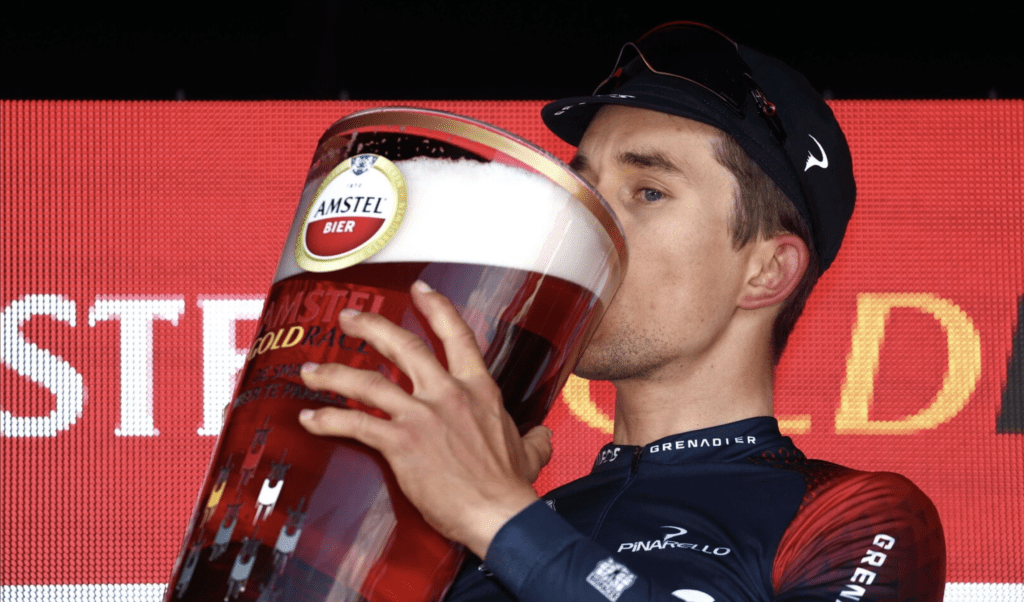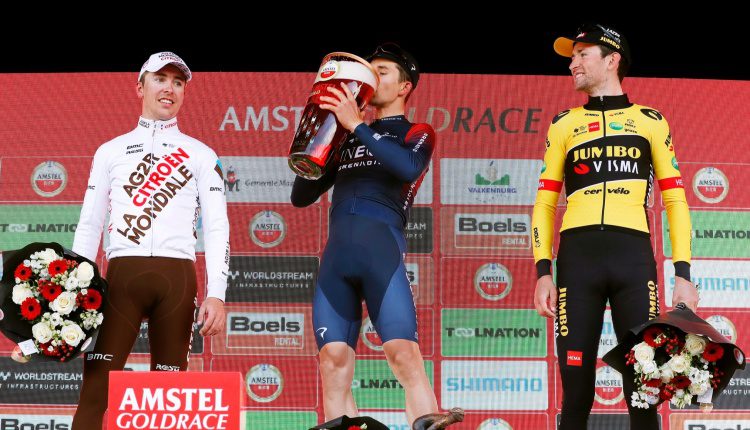At the 56th (Amstel) Gold Cycle Race, sponsored by Heineken’s brand Amstel, the winner Michał Kwiatkowski, was presented with an outsized beer glass. After taking a huge gulp from it, Mr Kwiatkowski then passed it on to the second and third place winners to also take gulps of alcohol. The women’s winner, Maria Cavalli, was also handed the gigantic glass. However, she declined to drink from it.
The problem is that this “prize” promotes a beer brand and heavy alcohol use. It also violates alcohol marketing regulations. The Dutch Advertising Code for Alcoholic Beverages, according to the Advertising Code Committee, states that no alcohol producer can use a glass more than twice the size of a standard 250ml beer glass. This rule is in place to stop the promotion of heavy alcohol use. Clearly, the beer glass handed to the winner of the race was bigger than two standard sizes. Michał Kwiatkowski needed both of his hands to hold this glass.
The Dutch Institute for Alcohol Policy, STAP, filed a complaint with the Advertising Code Committee regarding the use of this massive beer glass by Heineken. As the Committee ruled that it was a violation of the code, Heineken has said they will ensure it does not happen again in the future. But the damage is already been done. It is another clear example that the alcohol industry does not live up to its own slogan of “responsible” or “moderate” alcohol use.
Big Alcohol and Heineken’s barrage of sports alcohol marketing
STAP filed because of rising community concerns about the heavy alcohol marketing in sports that Big Alcohol companies are pushing.
The alcohol industry has always been going after sports sponsorship and marketing to increase brand awareness, link their brands and products with the heroics and physical performance of sports, and to drive sales of their products. Other than reaching thousands and even millions of sports fans, this strategy allows Heineken and other alcohol giants to specifically reach a younger audience, and align their products with the attributes of elite sports – disguising that their products are harmful. This is key for the alcohol industry to reach future consumers and thus, ensure profit maximization.
Big Alcohol in general and Heineken specifically have been amping up their sports sponsorship in recent years, specifically targeting women’s sports increasingly. Big Alcohol uses sports sponsorship as a method to increase brand awareness, specifically with younger audiences. This strategy is used to gain more consumers in the future and ensure profit maximization.
Recently, Big Alcohol has amped up its sports sponsorships and marketing even more.
Beer giants now sponsor:
- Sports clubs, such as PSV, Hockey Club Den Bosch, and TeamNL from NOC*NSF;
- Sports competitions such as Formula 1, the UEFA Champions League, the Europa League, and the national Dutch Football Cup (KNVB); and
- There are several sports events named after beer brands, such as the Amstel Gold Race, the Heineken Rowing Camp, and Bavaria City Racing.
Heineken has particularly been increasing their sports sponsorships and sports marketing.
The Dutch beer giant recently sponsored:
- UEFA Women’s Champions League,
- UEFA Women’s EURO 2022 and 2025, and
- The international motorsport championship for the world’s best female drivers.
Heavily investing in women’s sports is another strategy for Heineken to target women.
Heineken’s sports alcohol marketing strategy
The newly announced Heineken women’s sports sponsorships include various fan activities as well, such as exclusive DJ sets. The Heineken UEFA women’s tournament sponsorship is a multi-year sponsorship that will run until the end of the 2024/25 season. The partnership further offers Heineken additional options for sponsorship and marketing in ticketing, hospitality, branding, and gift rights, as well as digital fan activities such as the “Heineken Goal of the Round”. In the stadium, there are activities and experiences for fans such as the “Heineken Best Seat in the House” is used to market the brand.
Heineken’s multi-year agreement with W Series gives the beer brand visibility of Heineken 0.0 on the track during races. While Heineken 0.0 is the beer giant’s non-alcoholic product evidence shows Heineken just uses this product to market the brand name as a whole on occasions they cannot market their usual alcoholic options such as on the race track. Therefore, Heineken is indirectly marketing their alcohol products.
Through the W Series sponsorship deal Heineken will also be running the “Heineken Star of the Track” digital campaign, conducting various fan activities along the track, and running the “When You Drive Never Drink” campaign.
Scientific studies show that alcohol industry-run road safety campaigns are ineffective and can be even harmful. This is because while acknowledging that alcohol-impaired driving is harmful the alcohol industry only promotes ineffective solutions that don’t affect sales of their alcoholic products. Evidence shows effective road safety measures include laws such as zero tolerance for impaired driving laws and laws which increase penalties for driving under the influence. However, such laws can reduce alcohol sales and therefore are opposed by the alcohol industry.
By extending sponsorship deals to women’s sports Heineken is trying to appear more inclusive. But in reality, evidence tells a different story. This strategy pushes alcohol on everyone, everywhere, all the time. It minimizes people’s choices since they are constantly flooded with advertising designed to push them to consume alcohol.
Alcohol marketing in sports is harmful
Alcohol marketing exposure is linked to increased alcohol consumption, as per evidence by the Trimbos Institute. Scientific studies prove that young people who are exposed to alcohol marketing,
- Begin using alcohol earlier, and leads to young people who are not using alcohol beginning using, and
- Consume more alcohol if they are already using it.
Exposure to alcohol marketing through sports sponsorship is specifically linked to increased alcohol use among both youth and adults, as per a landmark scientific study published in the journal Alcohol and Alcoholism.
Young people see a lot more alcohol advertisements than older adults. For example, a survey among Dutch young people found that 29% – 34% of young people reported they had seen “a lot” to “very much” alcohol advertising at festivals, events, and music venues. In this survey Dutch youth also reported seeing more alcohol marketing in sports than older adults over the age of 30.
- 21% of Dutch youth said they saw marketing related to alcohol sponsorships in sports facilities, compared to 11% of those who were over 30 years of age.
- 12% of youth said they were exposed to premiums in sports accommodations while only 5% of those who were over 30 years reported the same.
Clearly, Big Alcohol is directing its marketing to young people to make them lifelong and brand loyal consumers of alcohol products.
Movendi International has extensively reported about the harms caused by alcohol marketing and specifically by alcohol sponsorships in sports. For example, in his opinion article on alcohol marketing and its harms, Movendi International’s Maik Dünnbier provides a comprehensive overview of all the issues under three main harms.
- Alcohol marketing causes harm to children and youth.
- Alcohol marketing saturates society with alcohol, and perpetuates the harmful alcohol norm.
- Alcohol marketing prevents evidence-based alcohol industry regulation.
The one effective solution to the harm caused by alcohol marketing is a complete ban on alcohol marketing or comprehensive restrictions on alcohol advertising, sponsorship, and promotion as recommended by the World Health Organization.
For further reading
Sources
EUCAM: “Dutch Advertising Code Committee: Heineken Promotes Excessive Alcohol Consumption“
M Sponsoring: “Heineken invests heavily in women’s sport“
Expertisecentrum Alcohol: “Exposure to alcohol advertising through sports sponsorship“

